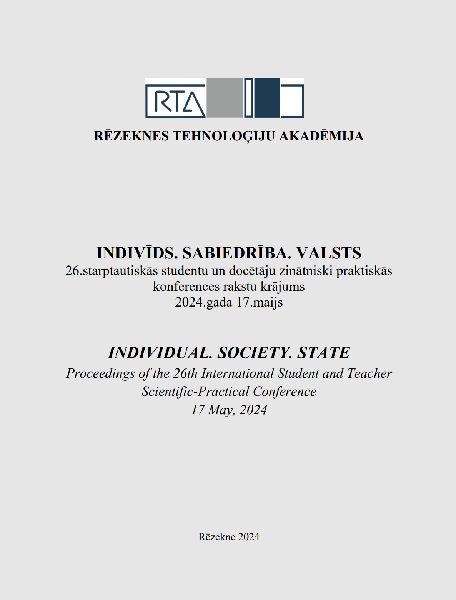EMPOWERING TOMORROW: UNLOCKING STUDENTS POTENTIAL THROUGH SOFT SKILLS DEVELOPMENT
DOI:
https://doi.org/10.17770/iss2024.8357Keywords:
soft skills, creativity, problem solving, critical thinking, leadershipAbstract
The development of soft skills is crucial for success in the modern workplace. Soft skills refer to a range of interpersonal, problem-solving, and communication abilities that are necessary for effective collaboration with others. Developing creativity, personal leadership, complex problem solving, and critical thinking skills among students in a real-life context with guidance from coaches and collaboration with companies. This article aims to address the following research questions: What is the theoretical perception of soft skills? How can soft skills be categorized based on theory and practice? Which categories of soft skills are distinguished from the students' point of view. First insights suggest that the problem-solving soft skill is the one that the students felt had enhanced the most during their studies, also it was the critical thinking the creativity that the students felt enhanced the most during their studies.
Downloads
References
Ashok Kumar1, Dr. Prabhu Nath Singh2, Dr. Shagufta N Ansari3, Sanjay Pandey4 Leadership Qualities Published by Sciedu Press 222 ISSN 1925-0703 E-ISSN 1925-0711
http://wjel.sciedupress.com World Journal of English Language Vol. 12, No. 3; 2022, Special Issue
Bruce, J. (2017). Why Soft Skills Matter And The Top 3 You Need. https://www.forbes.com/sites/janbruce/2017/03/10/why-soft-skills-matter-and-the-top-3-you-need/
https://www.ionos.com/startupguide/productivity/soft-skills/
Da Silva, B. X. F., Carolina Neto, V., & Gritti, N. H. S. (2020). Soft skills. Revista Interface Tecnológica, 17(1), 829-842. https://doi.org/10.31510/infa.v17i1.797
Deloitte. (2017). Soft skills for business success. https://www2.deloitte.com/au/en/pages/economics/articles/soft-skills-business-success.html
Hartikainen, E. (2014). Sitra Trends: Skills will challenge information – What will constitute general knowledge in the future? https://www.sitra.fi/en/articles/sitra-trends-skills-will-challenge-information/
Jääskelä, P., Nykänen, S., and Tynjälä, P. (2018). Models for the development of generic skills in Finnish higher education. Journal of Further and Higher Education, 42 (1), 130-142. doi:10.1080/0309877X.2016.1206858
OECD Future of Education and Skills 2030. (2018). www.oecd.org/education/2030-project
Gray, W. D. (2002). Simulated task environments: the role of high-fidelity simulations, scaled worlds, synthetic environments, and laboratory tasks in basic and applied cognitive research. Cognitive Science Quarterly, 2, 205–227.
Ross, S. (2014). A conceptual model for understanding the process of self-leadership development and action-steps to promote personal leadership development. Journal of Management Development, 33(4), 299-323. https://doi.org/10.1108/jmd-11-2012-0147
Touloumakos, A. K. (2020). Expanded yet restricted: A mini review of the soft skills literature. Frontiers in Psychology, 11, 2207. https://doi.org/10.3389/fpsyg.2020.02207



